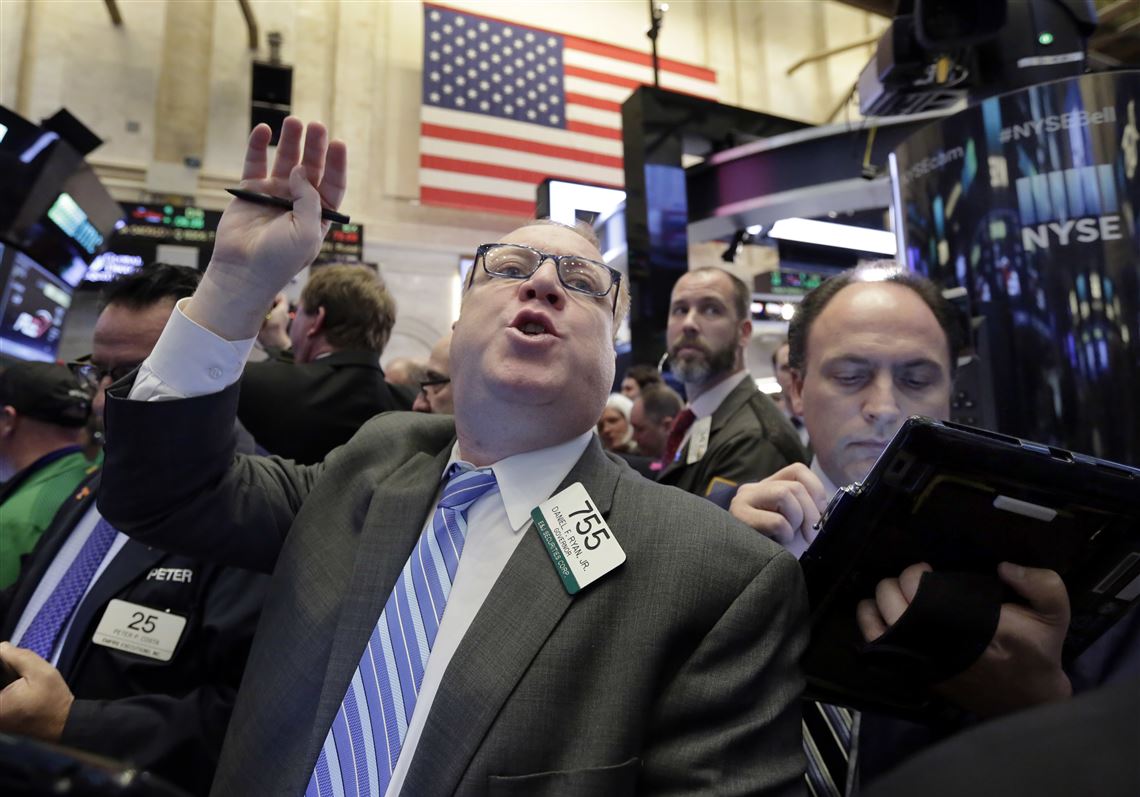Energy and real estate companies led U.S. stock indexes slightly lower in late-afternoon trading Friday after a mostly listless day on Wall Street. Health care stocks were up the most. Investors were sizing up earnings from American Airlines, Starbucks, Microsoft and other big companies. Bond yields fell after the government reported that the economy lost momentum in the last three months of 2016.
KEEPING SCORE: The Dow fell 22 points, or 0.1 percent, to 20,078 as of 3:28 p.m. Eastern Time. The Standard & Poor’s 500 index slid 4 points, or 0.2 percent, to 2,291. The Nasdaq composite index dipped 3 points, or 0.1 percent, to 5,651. More stocks fell than rose on the New York Stock Exchange.
THE ECONOMY: The Commerce Department said the U.S. economy grew at an annual rate of just 1.9 percent in the last three months of 2016, a slowdown from 3.5 percent in the previous quarter. For 2016, the economy grew 1.6 percent, the worst showing since 2011 and down from 2.6 percent in 2015. A separate government report showed businesses spent more on industrial machinery, semiconductors and other big-ticket items last month, a sign U.S. manufacturers seem to be doing better after a two-year slump.
THE QUOTE: “The market right now is at sort of at a crossroads,” said Tom Siomades, head of Hartford Funds Investment Consulting Group. “We hit that huge psychological barrier and busted through it when we hit (Dow) 20,000 ... but today’s GDP number came in, for the most part, below expectations and brought everyone back down to earth.”
WEAK BREW: Starbucks was down 4.2 percent a day after the coffee shop chain reported disappointing sales growth. The company said the popularity of its mobile order-and-pay option, which was supposed to make getting a drink easier, has caused bottlenecks at the areas where people pick up their drinks. Starbucks also cut its sales forecast for the year. The stock lost $2.48 to $55.99.
LOWER PROFIT: American Airlines Group fell 5.4 percent after the airline said earnings declined in the fourth quarter from a year earlier, when it received a huge tax benefit. The stock lost $2.69 to $46.90.
NOT GOOD ENOUGH: Shares in Chevron slid 2.5 percent after the oil company reported fourth-quarter results that fell short of Wall Street’s expectations. The stock shed $2.90 to $113.65.
ROUGH QUARTER: Colgate-Palmolive tumbled 5.3 percent after its fourth-quarter sales missed analysts’ estimates. The company’s 2017 forecast also disappointed investors. The stock fell $3.64 to $64.60.
UGLY OUTLOOK: Juniper Networks slid 3.8 percent after the computer networking equipment maker’s strong quarterly results were canceled out by a bad profit forecast for the current quarter. The stock fell $1.04 to $26.68.
PLEASANT STAY: Wynn Resorts surged 8.2 percent after the company’s revenue came in stronger than analysts expected. The stock added $7.84 to $103.35.
EVOLVED: Microsoft gained 2.3 percent a day after the software giant reported stronger-than-expected quarterly results, thanks to its focus on online services and business software rather than its legacy Windows operating system. The stock was up $1.46 to $65.73. It’s been at all-time highs for months.
TRUMP: Investors remain focused on the latest moves by President Donald Trump. His spokesman said the administration was considering slapping a 20 percent tax on imports from Mexico to help pay for his promised border wall, in an announcement that left markets uncertain about what it means for trade.
“I don’t know anyone who would think of a trade war as good thing, or tariffs,” Siomades said. “When you start going down that path, then the market all of a sudden retracts and says, ‘Wait a minute, we have 1.9 percent GDP growth, how are higher tariffs and restriction on trade going to make that better?‘”
MARKETS OVERSEAS: In Europe, Germany’s DAX fell 0.3 percent, while France’s CAC 40 slid 0.6 percent. Britain’s FTSE 100 gained 0.3 percent. In Asia, Japan’s benchmark Nikkei 225 index climbed 0.3 percent, helped by the dollar’s surge against the Japanese yen, while Hong Kong’s Hang Seng slipped 0.1 percent. Many Asian countries have begun holidays of varying lengths, curtailing trading across much of the region. Markets in China, South Korea and Taiwan were closed while Malaysia’s was open only in the morning.
ENERGY: Benchmark U.S. crude oil fell 61 cents, or 1.1 percent, to close at $53.17 a barrel in New York. Brent crude, used to price international oils, slid 72 cents, or 1.3 percent, to close at $55.52 a barrel in London. Wholesale gasoline dropped 2 cents to $1.53 a gallon, while heating oil fell 2 cents to $1.62 a gallon. Natural gas futures rose 1 cent to $3.39 per 1,000 cubic feet.
TREASURY YIELDS: Bond prices rose after the government reported its latest quarterly estimate of the nation’s economic growth. The 10-year Treasury yield fell to 2.48 percent from 2.51 percent late Thursday.
CURRENCIES: The dollar strengthened to 115.09 yen from 114.42 yen on Thursday. The euro rose to $1.0698 from $1.0692. The dollar weakened to 20.91 Mexican pesos from about 21.26.
METALS: The price of gold slipped $1.40 to $1,188.40 an ounce. Silver rose 29 cents to $17.14 an ounce. Copper added 2 cents to $2.70 a pound.
First Published: January 1, 2001, 12:00 a.m.
Updated: January 27, 2017, 8:54 p.m.
















